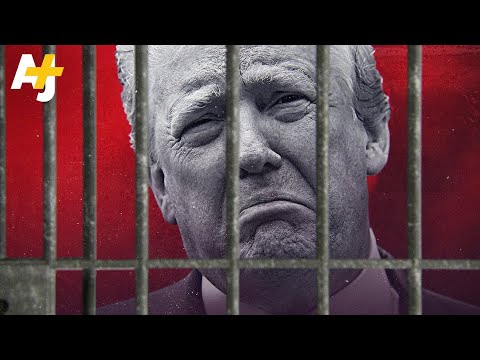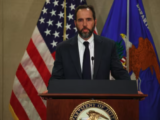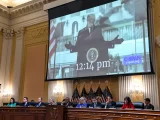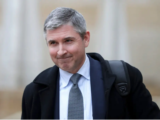The American People Want to See Trump on Trial for Insurrection –
Letters to Santa: The Number One Wish is to See Trump Behind Bars for Christmas –
The Big Picture –
By Glynn Wilson –
WASHINGTON, D.C. – Clearly the American people want to see Donald Trump, the former Republican president, prosecuted for his role in inciting the Jan. 6 Capitol insurrection.
They want him prosecuted by the United States Department of Justice for “insurrection,” which would prevent him from ever holding public office again.
Since the last impeachment vote in the U.S. Senate failed, that’s now the only barrier that would prevent him from running for office again in 2024. It may be the only thing to save American democracy from another insurrection in 2024.
The House Select Committee investigating the Jan. 6 Capitol attack appears to be focused “intently” on Donald Trump’s actions that day as it begins to discuss whether to recommend that the Justice Department open a criminal investigation into the former president, according to The Washington Post, which has been relentless in covering all the developments in this case like no other news outlet in the country since it’s a local story for them and they have the personnel here to do it.
Some of that coverage makes its way into discussions in other news outlets, and on cable TV political talk shows, but much of it does not. Most people in this country do not read The Washington Post, and cannot afford to pay for its paywall, or simply are not willing to pay for news. Republicans have been told its the “liberal press” and simply ignore it.
Not even taking a break for Christmas Eve, staff from The Post interviewed Committee Chair Bennie Thompson, the Democrat from Mississippi, who indicated a particular interest at this time is why it took so long for Trump to call on his supporters to stand down on Jan. 6. This is an area of inquiry that includes obtaining several versions of a video Trump reportedly recorded before finally releasing a message 187 minutes after he told his supporters to march on the Capitol during the rally that preceded the attack.
“It appears that he tried to do a taping several times, but he wouldn’t say the right thing,” Thompson said, basing his statement on information the panel has gleaned from interviews with witnesses as well as media reports about that day.
“That dereliction of duty causes us real concern,” Thompson said. “And one of those concerns is that whether or not it was intentional, and whether or not that lack of attention for that longer period of time, would warrant a referral.”
He said the president’s delayed response to the Capitol attack could be a factor in deciding whether to make a criminal referral, which is when Congress informs the Justice Department it believes a crime has been committed. It would be up to federal prosecutors to decide whether to pursue a criminal charge with a grand jury and put Trump on trial.
Let’s face it, a show trial would make for great television. Yes, it might fire up Trump’s insurrectionist buddies. But so what? Many of them will be in prison and as convicted felons will not be able to vote in 2024 anyway. It would take press and public attention away from Biden’s low public approval numbers and other domestic legislative failures and problems abroad.
A criminal referral against a former president would be “historic,” according to The Post, and would “ratchet up the political tensions that continue to swirl over the congressional inquiry into the worst attack on the Capitol since the War of 1812 as Trump considers running again for president.”
Thompson insisted that the committee is not deterred by criticisms from Trump and congressional Republicans and will seek to hold anyone to account for their role in what panel members say was an “attack on democracy” that has to be addressed.
“I can assure you that if a criminal referral would be warranted, there would be no reluctance on the part of this committee to do that,” he said.
A spokesman for Trump did not respond to a request for comment, although criticisms of the committee and its work are making the rounds on all the social media platforms and on conservative talk radio and cable TV talk shows.
As for what crime the panel believes Trump may have committed, Thompson echoed the assertion made by Wyoming Republican Liz Cheney, committee vice chair, that Trump’s actions could amount to criminally obstructing Congress as it sought to certify the election results.
But a charge of obstructing Congress would be a far cry from a charge of insurrection, which a recent op-ed in The New York Times pointed out would be the legal vehicle for preventing Trump from running for office again in 2024, or ever again.
“Only convicting them for participating in an insurrection would permanently disqualify them from office under Section 3 of the 14th Amendment,” wrote a bipartisan group of lawyers, including Laurence H. Tribe, a professor emeritus at Harvard Law School who Attorney General Merrick Garland studied under, along with Donald Ayer, a U.S. attorney in the Reagan administration and deputy attorney general in the George H.W. Bush administration, and Dennis Aftergut, a former assistant U.S. attorney.
“No person shall be a Senator or Representative in Congress, or elector of President and Vice-President, or hold any office, civil or military, under the United States, or under any State, who, having previously taken an oath, as a member of Congress, or as an officer of the United States, or as a member of any State legislature, or as an executive or judicial officer of any State, to support the Constitution of the United States, shall have engaged in insurrection or rebellion against the same, or given aid or comfort to the enemies thereof….”
That would also seem to prevent any of Trump’s co-conspirators from holding public office, including Republican Congressman Mo Brooks of Alabama, along with his counterpart in the U.S. Senate from that state, Tommy Tuberville. Brooks was on the stage with Trump inciting the insurrection, and Tuberville was photographed in the Trump Hotel in Washington with other “Stop the Steal” rally planners on the night of Jan. 5.
For that matter, any Senator who helped any of the insurrectionists get into the Capitol and voted against certifying the Electoral College results showing Joe Biden the winner in the presidential election of 2020 would seem to be open to a charge of being guilty of insurrection.
Under the laws of the United States (18 U.S. Code § 2383 – Rebellion or insurrection):
“Whoever incites, sets on foot, assists, or engages in any rebellion or insurrection against the authority of the United States or the laws thereof, or gives aid or comfort thereto, shall be fined under this title or imprisoned not more than ten years, or both; and shall be incapable of holding any office under the United States.”
OBSTRUCTION OF PENDING PROCEEDING is a crime under 1725.18 U.S.C. 1505:
“Section 1505 of Title 18, United States Code, as amended by the Victim and Witness Protection Act of 1982, forbids anyone from corruptly, or by threats of force or by any threatening communication, influencing, obstructing, or impeding any pending proceeding before a department or agency of the United States, or Congress. In 1996 Congress enacted a clarifying amendment to 18 U.S.C. § 1515, which defines the term “corruptly” as used in section 1505 to mean “acting with an improper purpose, personally or by influencing another, including making a false or misleading statement, or withholding, concealing, altering, or destroying a document or other information.
“Section 1505 also specifically prohibits anyone from withholding, misrepresenting, removing from any place, concealing, covering up, destroying, mutilating, altering, or by other means falsifying any documentary material, answers to written interrogatories, or oral testimony that is the subject of a proper investigative demand under the Antitrust Civil Process Act, 15 U.S.C. §§ 1311-14, with the intent of avoiding, evading, preventing, or obstructing compliance, in whole or in part, with that demand.”
It is not clear what the penalties are under this law. Of course being convicted of a felony in some cases prevents people from voting. But would it prevent someone from running for political office?
Attorney General Merrick Garland knows the law. It is time to act on it. The American people demand it.
I do not believe there is any way Joe Biden will be the Democratic Party’s nominee in 2024 or have any chance of being reelected to a second term as president unless this law is enforced. Millions of progressive Democrats will not stand for it. Remember, you heard it here first.
As for Thompson, he said the committee is weighing other potential criminal referrals surrounding the pressure put on state and local officials to overturn the results of the election, along with whether people raised money for the rallies and events surrounding Jan. 6 while knowing the claims of election fraud were false.
The New York Times reported this week that the panel was looking at a possible criminal referral for Trump and others as part of its investigation.
Thompson has not previously discussed the issue or what information will be key to making the decision, raising the stakes for the committee’s work and who should be held accountable for the violence of that day.
Bill Miller, a spokesman for the U.S. Attorney’s Office for the District of Columbia — which has been leading the Justice Department’s Jan. 6 investigation — declined to comment, pointing only to a statement he issued last week after the House voted to hold former White House chief of staff Mark Meadows in contempt for not complying with the panel’s subpoena.
“As with all criminal referrals, we will evaluate the matter based on the facts and the law, and the Principles of Federal Prosecution,” the statement said.
Trump has been highly critical of the panel’s work, saying it is partisan and that its only goal is to hurt him politically. He refers to it as the “Unselect Committee,” playing off its official title of the Select Committee to Investigate the January 6th Attack on the United States Capitol. Trump and Republican lawmakers have argued that the committee’s subpoenas and requests for information are fishing expeditions, and it is unclear how much the committee has uncovered beyond what is publicly known about what happened that day.
According to other background pointed out in The Post:
Senate Republicans blocked a proposal to create an independent commission to investigate the attack and House Republicans declined to participate in the select committee after Speaker Nancy Pelosi (D-Calif.) rejected two of their choices to serve on the panel.
Cheney and Rep. Adam Kinzinger (R-Ill.) accepted Pelosi’s invitation to join the committee, which also has seven Democrats, making them outcasts in their party.
Former federal prosecutor Randall Eliason said a referral from Congress has no legal effect. And in this instance, he said, Congress’s making referrals could hamper not only a possible Justice Department investigation, but also the lawmakers’ own inquiry.
A criminal referral, Eliason said, is mainly meant to “inform DOJ about something Congress has uncovered, if and when that might be useful.”
In an instance where a witness has lied to a committee in Congress in private testimony, a referral could be important because the Justice Department would not otherwise know about the falsehood. In an instance of criminal contempt, the law requires Congress to make a referral for the Justice Department to proceed, Eliason said.
“Here, DOJ is fully aware of these same events, so Congress wouldn’t be telling Justice anything that it didn’t know, in terms of the overall events of Jan. 6,” Eliason said of a possible criminal referral regarding the former president. “And I think the downside in a case like this is, it’s going to feed into any claim from Trump or anyone else who might be charged that this is really just a political witch hunt.”
Eliason said the committee’s focus on criminal referrals could also boost the claims of those resisting subpoenas that lawmakers’ inquiry doesn’t have a legislative purpose, but rather, is meant to uncover crimes.
A Washington Post investigation found that Trump resisted calls to intervene on Jan. 6 while watching the riot play out on television for 187 minutes before finally released a video calling on his supporters to stand down.
“I know your pain. I know you’re hurt,” Trump began. “We had an election that was stolen from us.”
After claiming he had won by a “landslide,” Trump told his supporters on the video that “you have to go home now.” He added, “We love you. You’re very special.”
Staffers in the White House were frustrated that Trump did not say anything sooner, and outside allies repeatedly sought to get messages to him to speak out, according to people familiar with the matter who spoke on the condition of anonymity to describe private discussions. Some contacted Meadows, while others tried to reach Trump through the White House switchboard.
Before posting the video on his social media accounts, Trump sent tweets disavowing violence, but also urged followers to press on at the Capitol as they sought to prevent lawmakers from certifying the electoral college results and declaring Joe Biden the next president.
During that time, three rioters died and scores of police officers were assaulted, some with their own weapons, while dozens of lawmakers feared for their lives in hiding.
“He wasn’t telling the people to go home,” Thompson said, characterizing Trump’s behavior that day. “He wouldn’t tell them that this is not the way to do it. So I think, since the taping was recorded at the White House, we’ll have access to it.”
The possibility of multiple recordings of a message from Trump to his supporters has been discussed in interviews with several witnesses, according to a person familiar with the panel’s work who spoke on the condition of anonymity because he was not authorized to discuss details.
The committee had requested that the National Archives turn over videotapes among a long list of items from Trump’s final days in office. Trump has sued to block release of the data requested by the committee. A three-judge federal appellate panel ruled against the former president earlier this month, but Trump filed his appeal to the U.S. Supreme Court on Thursday morning.
Congress has voted to hold two former Trump advisers — former White House chief strategist Stephen K. Bannon and Meadows — in contempt for defying subpoenas, and the Justice Department charged Bannon criminally with two counts of contempt.
Those referrals, though, are different from alleging crimes were committed by Trump or others on Jan. 6, in that Congress is the “complaining witness.” Asking the Justice Department to pursue a criminal case is necessary, said former U.S. attorney Barbara McQuade.
“As for other types of crimes, really Congress is like some other witness,” McQuade said. “They’re aware of information and they’re sharing it with the Justice Department.”
___
If you support truth in reporting with no paywall, and fearless writing with no popup ads or sponsored content, consider making a contribution today with GoFundMe or Patreon or PayPal.














